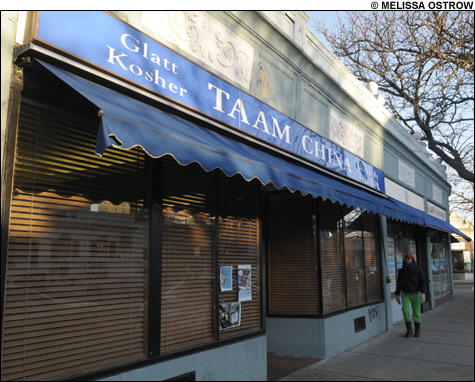
GLATT TO HAVE IT: Taam China is far from perfect, but it’s a fine option for kosher cuisine. |
| Taam China Glatt Kosher Chinese Cuisine | 617.264.7274 | 423 Harvard Street, Brookline | Open Mon–Thurs, 11 am–10:30 pm; Fri, 11 am–3 pm; Sat, 30 minutes after Shabbat–Midnight; and Sun, noon–10:30 pm | DI, MC, VI | full bar | no valet parking | sidewalk-level access |
Theoretically, there could be terrific kosher Chinese restaurants. In China and in New York, there are Chinese Muslim restaurants that don't serve pork, but do offer real Chinese food made with lamb and beef. And there is nothing in Jewish law that requires Chinese chefs to give up their core principles in order to prepare kosher food — Chinese cookbooks are full of authentic recipes made without pork or shellfish. They could also serve beef, chicken, fish, and Chinese vegetables, all stir-fried in peanut oil.But so many kosher Chinese restaurants are far from perfect. So what goes wrong? First of all, there is a powerful tendency to make ersatz porky Chinese-American food: egg rolls with strips of veal touched up with pink dye. I don't get this. If the customers at these places have always been religious Jews, then how do they know anything about Chinese-American food — for example, that the pork strips in egg rolls are typically dyed red? And if the kosher customers have only recently become religious, then some of them probably used to eat authentic Chinese food, so why don't they demand the superb fish and vegetables they used to order?

My other suspicion is that the Chinese chefs who work in kosher restaurants are not encouraged to shop in Chinese supermarkets, lest they make a mistake and buy something that isn't kosher. They probably figure the kosher supermarket has the meat they will need, plus American vegetables and a few quasi-Chinese sauces. (One brand is Soy Vey.) But within a mile of the Brookline Taam China (there's another in Newton Highlands), there is a very large Asian supermarket with all kinds of fresh fish and lychee fruit in season, plus Chinese broccoli and cabbages and fresh water chestnuts and numerous kinds of rice, fresh bamboo shoots and pea tendrils and tiny Cambodian eggplants and mouthwatering garlic and Asian basil and . . . an even more extraordinary variety of non-kosher temptations.
All that postulated, Taam China's kosher dishes are several steps above similar offerings I've had in Boston and New York. The restaurant also has moderate prices and has won a mixed customer base that even includes a few Asian-Americans. So we're making progress.
Let's begin with that egg roll ($1.95). The beef flavor doesn't dominate the cabbage and onions, and the whole thing is rolled into a flaky pastry like a knish or a pierogi that I find quite savory; it's actually an improvement on standard egg-roll skins. It's oily, but so are most egg rolls. Peking ravioli ($5.95) are all-beef, fully gingered, and, to some tastes, superior to the pork kind. The pasta is on the thick side, as one finds in many Cantonese restaurants, and the dip isn't amazing, but these are excellent dumplings nonetheless.
On the other hand, barbecue spareribs ($10.95) are beef short ribs, and not the meatiest. They're treated like Chinese pork ribs (but spared the red dye), and are tough and hard to eat. I miss the fresh Chinese mustard we typically get with this dish. I suggest the owners of Taam China consult with Korean cooks, who really know their short ribs and get a much better effect by cutting the ribs differently and marinating them. Kosher butchers could do this too — perhaps they could use Soy Vey.
Of the main dishes, my personal favorite was chou yu kew ($14.95), a dish of very lightly battered fish filets, really almost sautûed in the meunière style, with carrot, zucchini, onion, and cultivated mushrooms. It was made great by the freshness of the fish (pollock, probably), the unfailing magic of under-fried vegetables, and a wisp of light white sauce. There is a full list of vegetarian plates, including some Chinese cabbages and greens. We chose sautûed string beans ($9.50). This is a dish properly made with Chinese long beans; it often includes some ground pork, but the Taam China version had beans nicely flecked with real wok searing and plenty of garlic.
Fried food is an important part of the American conception of Chinese restaurants, and at that, Taam China is okay, but only middling. I had hoped Szechwan crispy beef ($13.95) would be made with the same technique used for twice-fried pork, but it was actually breaded and fried, with only a bit of hot pepper in the sweet-and-sour sauce. It was reasonably crisp, and had the requisite flavor of salt and freshly browned food. General Gau's chicken ($13.50), in the same style, has a little more ginger in the sauce.